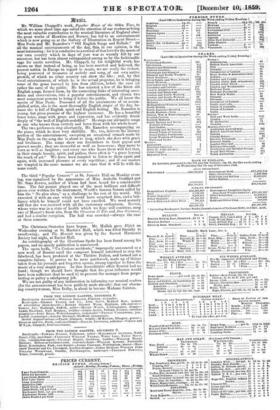Ellitf.
Mr. William Chappell's work, Popular Music of the Olden Time, to which we some short time ago called the attention of our readers as being the most valuable contribution to the musical literature of England since the great works of Hawkins and Burney, has led to an entertainment which is now going on at the Gallery of Illustration in Regent Street- Miss Poole and Mr. Ramsden's "Old English Songs and Ballads." Of all the musical entertainments of the day, this, in our opinion, is the mot interesting ; for it is conducive to a revival of that love for the music of our own country which in days of yore was so warmly felt by our ancestors, but has been almost extinguished among us by the fashionable rage for exotic novelties. Mr. Chappell, by his delightful work, has shown us that instead of being, as has been asserted and believed, the poorest nation in Europe in regard to music, we are really the richest, being possessed of treasures of melody and song, of our own native growth, of which no other country can show the like ; and, by this vocal entertainment, of which he is the actual projector, he is bringing some of the gems rescued by him from oblivion, before the eyes (or rather the ears) of the public. He has selected a few of the finest old English songs, formed them, by the connecting links of interesting anec- dotes and observations, into a popular entertainment, and chosen two most competent persons to bring it before the public. We all know the merits of Miss Poole. Possessed of all the attainments of an accom- plished artist, she is the most thoroughly English singer of the day, be- cause she is full of English spirit and English feeling. Mr. Ramsden is young, but gives promise of the highest eminence. He has a beautiful tenor voice, sings with grace and expression, and has evidently drunk deeply of "the well of English undefiled." He sings our old native songs as one who knows them entirely and loves them with his whole heart.
The two performers sing alternately, Mr. Ramsden accompanying on the piano, which he does very skilfully. He, too, delivers the literary portion of the entertainment, excepting an occasional remark made by Miss Poole on the song she is about to sing, which she does with grace and liveliness. The songs show our forefathers in their gayest and gravest moods ; they are mournful as well as humorous ; they move to tears as well as laughter ; and every one who hears them will feel that, in their simple beauty, spirit, and pathos, there often is "a grace beyond the reach of art." We have been tempted to listen to them again and again, with increased pleasure at every repetition ; and if our readers are tempted in the same manner we are sure that it will be with the same result.


























 Previous page
Previous page